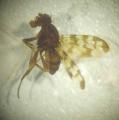Diptera.info :: Miscellaneous :: General queries
|
Non english names conventions
|
|
| zcuc |
Posted on 19-04-2011 20:08
|
|
Member Location: Israel Posts: 492 Joined: 08.10.07 |
Hi, I have question regards non English names conventions. 1. From International Commission on Zoological Nomenclature: Recommendation 51B. Transliteration of author's name. When the author's name is customarily written in a language that does not use the Latin alphabet it should be given in Latin letters with or without diacritic marks. But I can't see many papers that are published without diacritic marks. Is it appropriate? 2. Why I can see that in some papers Herrich-Schäffer is written as Herrich-Schaeffer although the name in the original paper is written with umlaut? Doesn't the name should be as the author write it? Thanks Edited by zcuc on 19-04-2011 20:29 |
|
|
|
| Nikita Vikhrev |
Posted on 19-04-2011 20:48
|
|
Member Location: Moscow, Russia Posts: 9533 Joined: 24.05.05 |
I'm totally agree with Zcuc's bewildered. I'm very much bored with editorial demands to use diacritic marks. The energy that editorial boards waste for fight for diacritic marks presence might be used much more uselful!
Nikita Vikhrev - Zool Museum of Moscow University |
|
|
|
| Oleg Kosterin |
Posted on 20-04-2011 08:39
|
|
Member Location: Posts: 5 Joined: 26.03.08 |
I'm afraid Nikita confused Zcuc's intention who fights for diacritic marks to be present. 'ae' is an accepted Latin transliteration of "ä", although I do not know if and how this transliteration is codyfied. The same 'ue' and 'oe' for the corresponding umlauts. |
|
|
|
| ChrisR |
Posted on 20-04-2011 09:10
|
|
Super Administrator Location: Reading, England Posts: 7706 Joined: 12.07.04 |
Rules of nomenclature and the various editorial policies on submitted papers leave me a little baffled sometimes too. But in my opinion the ICZN seems clear that diacriticals are allowed for author's names so in the case of an author ( like "Herrich-Schäffer" ) who writes their name in the Latin alphabet with diacriticals then they should retain them ... but the editor of the journal that publishes the article might disagree - or might just make a mistake. Far more difficult is when a name is transliterated from a non-Latin alphabet, like Cyrillic or Chinese, because this often leads to many different spellings of the same author's name - attributed to different (or the same) species. This can be a big headache for people making databases of species names, synonyms and authors because which spelling is valid and do the different spellings actually equate to the same person? Very tricky question and I don't think there are any easy answers 
Edited by ChrisR on 20-04-2011 09:12 Manager of the UK Species Inventory in the Angela Marmont Centre for UK Biodiversity at the Natural History Museum, London. |
| Igor Grichanov |
Posted on 20-04-2011 10:35
|
|
Member Location: St.Petersburg, Russia Posts: 1798 Joined: 17.08.06 |
Regarding old names, there is a traditional spelling fixed usually in the recent catalogs. E.g., Fallén is almost always written as Fallén, while Gerstäcker is often (or even more often) written as Gerstaecker. Modern authors usually save diacritics in their names. Some Turkish and Slavic authors are unlucky, publishing their papers abroad, despite the use of Latin alphabet. Some American and other journals have just no letters with rare diacritics in their computers. There are some problems with Russian authors who write predominantly or exclusively in Russian, but do like either German or French spelling of their names in species description. Therefore, the name of the same scientist in international reference lists looks often quite different from his name in species catalogs. I think an author of catalog may write something like A-us b-us Tsurik (as Zurik) or A-us b-us Shamshin (as Chamchin). Igor Grichanov |
| zcuc |
Posted on 20-04-2011 12:49
|
|
Member Location: Israel Posts: 492 Joined: 08.10.07 |
The nomenclature rules could be very confusing. As Igor had written I can see many recent catalogs that translate ä to 'ae' as in Herrich-Schaeffer(Herrich-Schäffer) and Gerstaecker(Gerstäcker) but keep other diacritic marks such Stål. The problem is even worse when the origin on the name is impotent since ü in Turkish is a distinct glyph but ü in German alphabet is just umlauted form of u and can be written as 'ue'. Not to mention other Turkish, Azeri etc... marks that I have no clue about their grammar rules. My original question was to ask (lets put editorials rules a side for the moment) if you think that Recommendation 51B should be adopted in the way that diacritic marks should be omitted from authors names? I think this way the name convention could be much simpler and unified for all languages? |
|
|
|
| ChrisR |
Posted on 20-04-2011 13:32
|
|
Super Administrator Location: Reading, England Posts: 7706 Joined: 12.07.04 |
I would keep diacriticals, if they are the accepted way of spelling the author's name because I would rather use one version of the name and not risk creating other "author synonyms". In the modern world it is easy to find these forms of the letters on any computer so it shouldn't be a problem 
Manager of the UK Species Inventory in the Angela Marmont Centre for UK Biodiversity at the Natural History Museum, London. |
| zcuc |
Posted on 20-04-2011 20:03
|
|
Member Location: Israel Posts: 492 Joined: 08.10.07 |
ChrisR, I think you are right. In order to keep unified spelling of the same author, The original Latin letters must be used as originally written without and conversions such ä to 'ae', but since ICZN allow to write the name with both diacritic marks or without we can never reach to perfect single spelling system. |
|
|
|
| Jump to Forum: |













